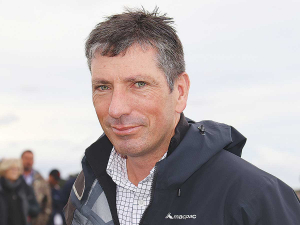Cleland named OSPRI chair
Southland farmer and director Tony Cleland has been named OSPRI New Zealand’s new chair.
 Beef+Lamb NZ chief executive Sam McIvor says the devil will be in the detail of the changes in freshwater plans.
Beef+Lamb NZ chief executive Sam McIvor says the devil will be in the detail of the changes in freshwater plans.
Beef + Lamb New Zealand (B+LNZ) has given a tentative nod of approval to the government's change of heart over fresh water farm plans.
However, the industry good body says the devil will be in the detail.
In particular, B+LNZ is pleased by proposed changes to the stock exclusion regulations and the low-slope map. Chief executive Sam McIvor says the Government's original low slope map identified thousands of hectares of steep land as low slope and therefore required fencing, which was unworkable and wouldn't deliver good environmental outcomes.
"That's why we are pleased the Government has listened and changed the stock exclusion trigger from a 10 degree slope to a five degree slope and introduced an altitude limit," he told Rural News. "That means if the area of an extensive farming operation is at a certain altitude, or/and above five degrees slope, it will not be required to be fenced. That's a common sense solution." McIvor says the industry good organisation also supports the improvements to the spatial resolution of the low slope map, but says they are concerned that a level of inaccuracy remains. He says the outcome is that the bite of the regulations has been reduced and, overall, the regulations are far more workable and effects-based.
"However, we now need to discuss the practical implications with our farmers."
McIvor says B+LNZ has been clear from the outset that farm planning should be farmer-owned, effects-based in relation to environmental outcomes. He says it needs to enable innovation, adaptation and be flexible enough to respond to different, not one size fits all.
"There are indications in the document that the Governmen has responded to that."
However, McIvor says there is still a lot of concern among farmers about the Government's proposed Certified Freshwater Farm Plan. He says this relates to the extent it will prescribe what farmers can do, the costs associated with certification and auditing, as well as the extent to which farmers' personal or business information will become publicly discoverable.
"Farmers need workable and relevant rules and B+LNZ has been calling for effects-based approaches at the paddock scale to both winter grazing and to stock exclusion, delivered through effectively farm planning," McIvor says.
"Our expectation is that the Government will further consult with the sector on these regulations."
One of New Zealand’s longest-running pasture growth monitoring projects will continue, even as its long-time champion steps away after more than five decades of involvement.
The Insurance & Financial Services Ombudsmen Scheme (IFSO Scheme) is advising consumers to prepare for delays as insurers respond to a high volume of claims following this week's severe weather.
Additional reductions to costs for forest owners in the Emissions Trading Scheme Registry (ETS) have been announced by the Government.
Animal welfare is of paramount importance to New Zealand's dairy industry, with consumers increasingly interested in how food is produced, not just the quality of the final product.
Agriculture and Forestry Minister Todd McClay is encouraging farmers and growers to stay up to date with weather warnings and seek support should they need it.
The closure of SH2 Waioweka Gorge could result in significant delays and additional costs for freight customers around the Upper North Island, says Transporting New Zealand.